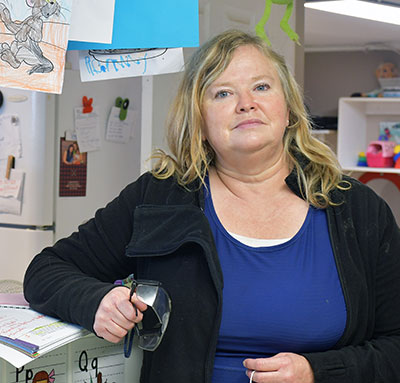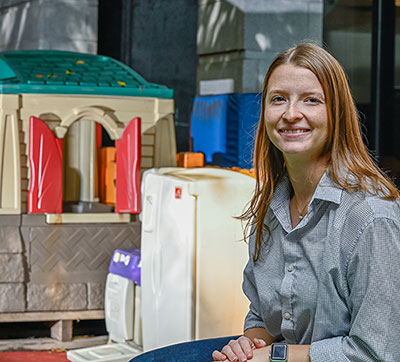On March 13, 2020, the Minister of Families, Mathieu Lacombe, announced the closure of all educational services. He would change his mind two days later, asking all services to open for parents working in a service deemed essential. Myriam Chayer and Josée Lemire lived this period with a great amount of stress.

“The manager summoned all personnel to evaluate how many children we would have, recalls Myriam Chayer, educator at Le Petit Palais daycare centre (CPE) in Montréal. We eventually welcomed 19 children who were not of our CPE, because their service had closed.”
Meanwhile, Josée Lemire, home childcare provider (RSE) in Sherbrooke, chose to keep her service open, since the parents of eight of her nine children worked in essential services.
Even if, in the weeks that followed, the Minister of families authorized all home childcare services who wished to do so, to close with full compensation, it was out of the question for Josée Lemire. “It was stressful, but I felt an obligation to continue. It’s like we were going to war. We had to allow parents to go take care of the sick. Nurses needed to have peace of mind,” she says.
Adapting to instructions and changes
As the pandemic evolved, the government’s instructions completely changed. It was the case, for example, with the instructions surrounding personal protection equipment. “It was hard to be told that, yesterday, we were not allowed to wear a mask, but today, we are required to have one. At our CPE, that’s how it happened,” recalls Myriam Chayer.
“We went to the frontlines without a mask!” insists Josée Lemire, who found the situation stressful. She states, however, that she redoubled her efforts to stay true to herself and continue her work with the children.
Unknown parents
A major difference between Josée Lemire and Myriam Chayer’s experiences has been not knowing the children. While Josée Lemire’s little ones remained the same, Myriam Chayer welcomed four new children in her group without having the opportunity to talk with the parents. The COVID-19 measures put in place forced the family to stay outside the CPE.
“The pedagogical aspect was a bit left aside, she recognizes. It’s difficult to make observations about a child you don’t know. My objective was thus to establish a connection with the child by focusing on their interests, so they would want to come back the next day.”

Rules to respect
In the first weeks, at the CPE, hygiene rules were at their height. Groups couldn’t cross each other outside, every toy had to be disinfected after use, items made of wood and other materials that could increase spread were removed: the job became more one of monitor than educator.
The adaptation, however, was more difficult for the adults than for the children, claims Myriam Chayer. “When parents from the health network arrive with a mask and their child jumps into your arms, while you were told not to wear a mask, you have some worry,” she recalls, mentioning the contradictory instructions between the networks at the beginning of the pandemic.
The lack of recognition
With all these changes and adaptations, both educators were hoping for a better recognition from Minister Mathieu Lacombe and the government. “We didn’t even get a little pat on the back. Parents were telling me they didn’t understand how come we weren’t better recognized,” says Josée Lemire.
In family environments, none of all those additional duties were financially compensated. “It’s outrageous, she adds. I love my profession, but at one point, I started to cry, to worry, and I decided to shut down my service. But, fortunately, I ended up reversing my decision after talking with my son.”
Josée Lemire says that, despite the lack of recognition from the government, the situation has increased the parents’ awareness about the essential nature of the services they provide. “All the parents of my service’s children supported me, even in the more difficult moments,” she concludes.
